Ask Jeeves — but don’t expect Alexa to help you track down a murderer

Alexa, could you play me some Bob Dylan? Alexa, what’s the traffic like today? Alexa, could you give evidence in a court trial, please?
That’s a question seriously asked by a US judge. The case in question is a double murder of two women in a house in New Hampshire. There’s a chance that the Amazon Echo installed in the house was given a “wake” word and therefore recorded what happened when the assailant went in. The judge would like Amazon to produce any recording made. It has declined on grounds of privacy.
Up to the Second World War, the big houses of England were crawling with servants who were all ears to doors, and eyes on the comings and goings in a house, and never shy of gossiping. Socialism and the arrival of white goods swept them away, but now back in our homes and in our pockets are the modern-day equivalents of butlers and maids. We hand out their commands, ask them to plan journeys, turn on heating — and they jump to our command. Remember one of the early search engines was called Ask Jeeves?
So I’m a bit confused that Amazon at this point is bringing up privacy as an argument in a murder trial. Because in this particular case, Alexa’s dead owner would likely think it a bit rum. This may be a bit philosophical for a machine with limited AI, but if these new technological servants are meant to be able to serve us and even foresee our every need, they might well predict that we’d like them to find their murderer.
Amazon treats Alexa like proprietary technology; we treat them like our own domestics. And were our own butler to witness our murder, he’d not only be compelled to give evidence, he’d also be bound by loyalty to his master. Provided the butler didn’t do it...
Sibling rivalry makes us or breaks us
Liane Moriarty, the author of Big Little Lies, has said she managed to write the book that turned into to a Nicole Kidman-fronted TV series thanks to “sibling rivalry”. Her sister Jaclyn is a novelist too. If she can do it, why can’t I, will have been the thinking.
Now, in a sensible family, all children should head off on their own course. But who has ever heard of a sensible family? And without sibling rivalry, would we have had the great face-off of the Miliband brothers competing for the leadership of the Labour Party? Where would we be if the Mitfords and Brontës hadn’t sat in their rooms scribbling away driven by the desire to better their sisters in the novel-selling stakes?
The current crop of Johnsons (recently resigned Transport Minister Jo, pictured) who infest public life could have headed off to be bus drivers and accountants, but no. Sibling rivalry drives us to madness, but also to greatness.
If our greatest competitor is ourselves, those sharing half our DNA are the next best thing.
Re-run of the vote worked for Churchill
IVOR Gaber, professor of political journalism at Sussex, has noted in a letter to The Times that the 2016 referendum was not “the biggest ever democratic exercise in British history”. Turnout was 72.3 per cent, but 12 elections since the war have had bigger percentage turnouts.
He’s right. In 1950, for example, Clement Attlee scraped home for a second term, a tight election with an astonishing 83.9 per cent turnout. But within a year the country was asked to vote again — was that a “negation of democracy”? — and this time 82.6 per cent of the population turned up. Churchill puffed his way back into No 10. Having a re-run worked out OK for him.
Keep teenagers off vaping but not me
I grabbed a couple of packs of mango-flavoured Juul Pods just before I flew out of the US this week. Little did I know that these were about to become a collector’s item.
The TV screens in the airport announced that Juul, makers of the wildly popular USB stick-style e-cigs, is ditching flavours such as mango and crème brûlée as a backlash begins about the craze of teenagers vaping them. Good.
The US sells high-strength pods — the EU only allows weaker ones — and they are the nicotine equivalent of crack. I’m hooked. I’m inclined to suggest that they should be issued to all older smokers if we want to get our nation to kick the habit.

 Yahoo News
Yahoo News 
